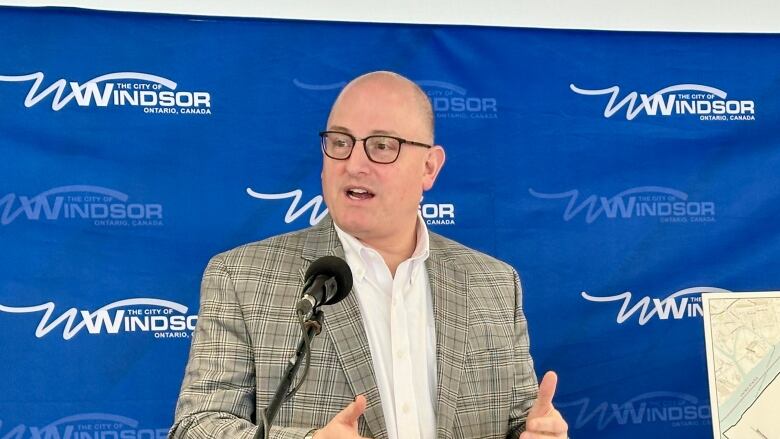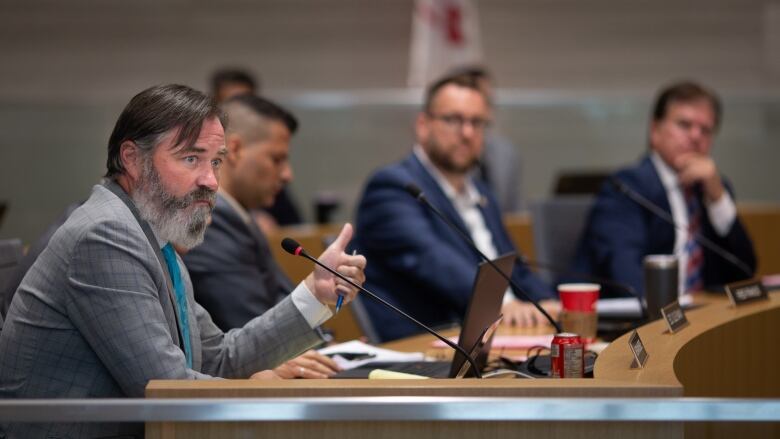Rejection of Windsor's $70M Housing Accelerator Fund application 'disappointing': Mayor
The funding was contingent on allowing 4 units by right on any residential property

The federal government's rejection of Windsor's application to the Housing Accelerator Fund (HAF) is "disappointing" as the city struggles with a shortage of housing, mayor Drew Dilkens said.
Windsor had applied for as much as $70 million, which would have been used to build more housing in the southwestern Ontario city. The rejection was largely due to the city's refusal to commit to allowing four units by right on any property in the city.
The rejection came from federal housing minister Sean Fraser, andwas confirmed on Wednesday by a spokesperson fromWindsor-Tecumseh Liberal MP Irek Kusmierczyk's office.
"The Minister rejected our reasonable proposals and said 'no' to densification along 47 km of transit corridors," Dilkens said in a statement issued Wednesday night.
"The Minister rejected reasonable densification on almost 1000 acres of land in commercial and mixed-use nodes, that once built-out would allow us to exceed our housing target many times over."
Dilkens said allowing four units and four stories on all residential lots without public consultation"does not work for our city."
"Without question, there is an urgent need for more homes, here and all across the country," Dilkens stated. "As mayor of the city of Windsor, I am steadfast in my commitment to safeguard Windsor neighbourhoods and the vital infrastructure that supports them."
"I refuse to compromise our neighbourhoods and to do away with fair public consultation with our residents in exchange for uncertain funding that will be tied to sacrificing the makeup of our communities."
In a letter to Dilkens,Frasersaid he watched council's Jan. 22meeting, where council decided "to stop short of the best practices we published to encourage cities to increase their ambition in their applications to the fund."
"[And]in the presence of applications from neighbouring cities that are determined to meet those standards, I cannot approve Windsor's application," Fraser wrote in theletter obtained by CBC News.
Fraser said his team had proposed an alternative motion to what the city had drafted, and it was "less ambitious"than other cities including London had committed to.
"I expect my decision on this application will not come as a surprise," he wrote.
"There are municipalities in this country who have opted to end exclusionary zoning, and municipal governments who have made bold decisions to improve housing availability in their communities," Fraser wrote. "With more than 500 applications, and a finite amount of cash in the fund, only the most ambitious communities will receive funding."
Kusmierczyk told CBC News the denial of HAF funding was a "forgone conclusion"after council's stance on four units.
"I'm disappointed again for the working families that are struggling to find a home. I'm disappointed for seniors and young people that are struggling to find affordable housing," Kusmierczyksaid. "They're seeing their rent going up and they're expecting us, they're looking to us to work together to do everything we possibly can to get more housing built."
Kusmierczyksaid comparable cities like London, Hamilton and Guelph have signed onto the HAF fund.
"This is all about one unit: moving from three units to fourunits," Kusmierczyk said, noting the provincealready allows three units by right.
Last week,councillors opted to submit the city's application, which would allow four units by right in some parts of the city, but not all, to the fund as originally proposed despite information that identified the four-unit condition as a "minimum ticket" to unlocking up to $70 million in funding.
City staff have previously said the application was submitted last summer, before the federal government instituted the four-unit condition. The application was submitted as is last week with an 8-3 vote of council. Councillors also voted to study the issue further.

The dissenting votes were CouncillorsKieran McKenzie, Fabio Costante and Renaldo Agostino.
On Wednesday, McKenzie said he was not surprised by the decision.
"The City of Windsor is currently in a housing crisis. That fact is undeniable," he said. "We made the conscious decision to not proceed with an application that would be successful.
"The correspondence from the minister certainly comes as no surprise, unfortunately, but this is where we are today."
Ward 7'sAngelo Marignani, who was one of eight councillors who supported applying to the HAF fund without meeting the four-unit condition, said he was disappointed by the outcome.
"I'm happy to see that upper levels of government are really trying to help us; provincial and federal," he said, noting he believes there will be a future round of HAF funding to which the city could apply. "I appreciate that co-operation."
With files from Chris Ensing and Dalson Chen












_(720p).jpg)


 OFFICIAL HD MUSIC VIDEO.jpg)
.jpg)



























































































